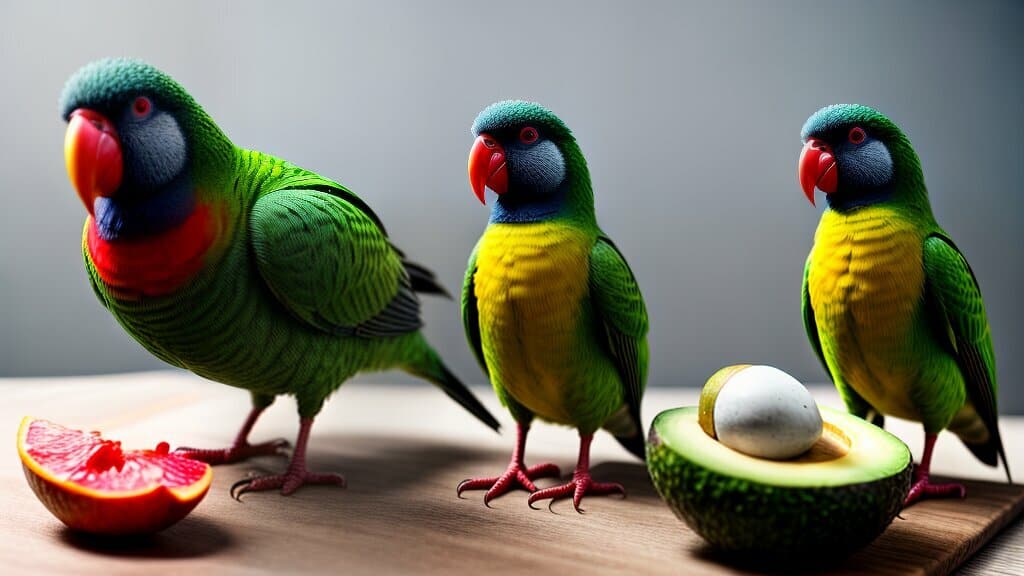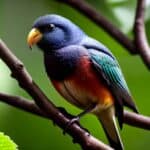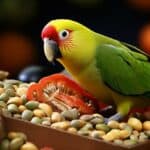If you are a kakariki owner, you may wonder if feeding your feathered friend avocado is safe. While avocado is known for its health benefits for humans, not all foods that are good for us are suitable for animals. In this article, we will explore the potential risks and benefits of feeding avocado to kakarikis and provide practical tips for feeding them a healthy and balanced diet.
Can Kakarikis eat avocado? Kakarikis have dietary restrictions, a significant one being the ingestion of avocado. Unfortunately, avocado is highly toxic to Kakarikis, as it is to many birds. It contains a toxin called persin, which can cause fatal heart damage and other serious health issues in birds. Therefore, feeding avocado to Kakarikis, under any circumstances, is strongly discouraged. Despite their general adaptability to various fruits and vegetables, avocados remain a high-risk food item for these colourful birds.
Key Takeaways:
- Kakarikis have specific nutritional needs that must be met for their well-being
- Avocado may pose health risks to kakarikis and caution should be exercised when considering it as a part of their diet
- There are plenty of safe and beneficial food options for feeding kakarikis a healthy diet
- Regular monitoring of your kakariki’s health and diet is crucial for ensuring their well-being
Understanding the Kakariki Diet
Kakarikis are small parrots that require a balanced and healthy diet to thrive. Feeding them the right nutrients is essential for their growth, development, and overall well-being. In the wild, they primarily feed on a diet of seeds, fruits, berries, and insects. However, in captivity, their diet may need to be adjusted to ensure it meets their nutritional needs.
| Nutritional Needs of Kakarikis | Kakariki Food Options |
|---|---|
| Kakarikis require a diet that is high in protein, vitamins, and minerals. | There are many food options that can provide the necessary nutrients for kakarikis. Seed mixes, pelleted food, fresh fruits and vegetables, and protein sources such as cooked eggs or tofu are all suitable options. It’s important to note that not all fruits and vegetables are safe for kakarikis, and some foods may need to be avoided due to potential health risks. |
It’s also essential to ensure that the food provided to kakarikis is fresh and free from contaminants. Regularly cleaning their food dishes and replacing any uneaten food can help prevent the growth of harmful bacteria.
By understanding the nutritional needs of kakarikis and providing them with a diet that meets their requirements, owners can ensure the health and longevity of their feathered friends.
Avocado: Is it Safe for Kakarikis?
Avocado is a popular fruit with many health benefits for humans. However, when it comes to feeding our feathered friends, caution must be exercised. While some sources claim that avocado is safe for birds, the general consensus among avian specialists is that it should be avoided in their diet.
The primary issue with avocado is its high fat content. While healthy fats are essential for birds, the type of fat found in avocado, called persin, can be toxic to them. Persin can cause damage to a bird’s heart, lungs, and other organs, leading to serious health problems or even death. Additionally, avocado skins and pits can pose a choking hazard to birds.
“Avocado should not be fed to birds under any circumstances, as there is potential for serious and life-threatening health issues.” -Dr. Laurie Hess, DVM, Dipl ABVP (Avian Practice)
While it may be tempting to offer your kakarikis a taste of avocado, it’s important to prioritize their health and avoid potentially harmful foods. Stick to safe and healthy options for their diet, and if you have any concerns about their nutritional needs, consult a professional avian specialist.
The Potential Dangers of Avocado for Kakarikis
While avocado might seem like a healthy snack for humans, it can be toxic to many animals, including birds. Avocado contains persin, a type of fungicidal toxin that is safe for humans, but can cause respiratory distress and heart failure in birds.
Kakarikis are particularly susceptible to the harmful effects of persin, as they have a highly sensitive respiratory system. Consuming avocado can lead to breathing difficulties, wheezing, and coughing; in severe cases, it can even result in death.
In addition to the risks posed by persin, the high fat content in avocado can also have negative consequences for kakarikis. As small parrots, kakarikis require a low-fat diet in order to maintain a healthy weight and prevent a range of health problems. Feeding them foods that are high in fat can lead to obesity and related health issues such as heart disease, liver problems, and even early death.
Expert Tip: It’s essential to remember that just because a food is safe for humans does not mean it’s safe for our pets. Always do your research before introducing any new food to your kakariki’s diet.
In light of these potential risks, kakariki owners must exercise caution when considering feeding their bird avocado. While it might be tempting to share your favourite healthy snack, it’s important to prioritise your kakariki’s health and well-being above all else.
Nutritional Value of Avocado
Avocado is considered a superfood for humans, packed with healthy fats and various nutrients such as vitamins C and K, folate, and potassium. But what about its nutritional value for kakarikis?
While avocados are not toxic to kakarikis, they do not provide any significant nutritional benefits for these parrots. Unlike humans, who can benefit from the healthy fats found in avocados, kakarikis do not require high-fat foods in their diet. Instead, their diet should consist of a variety of fresh fruits and vegetables, grains, and protein sources such as cooked chicken or boiled eggs.
It’s important to note that giving too much avocado to your kakariki can lead to digestive issues due to its high fat content. In addition, the presence of persin, a natural fungicidal toxin found in avocados, can be harmful to some animals but is not a concern for kakarikis specifically.
In summary, while avocado may be a healthy addition to a human’s diet, it should not be a staple food for kakarikis. Other nutritious options should be prioritized to ensure your feathered friend’s optimal health and well-being.
Alternatives to Avocado for Kakarikis
While avocado may not be the best food choice for your kakariki, there are various safe and nutritious alternatives to ensure their dietary needs are met.
Kakarikis prefer a varied diet consisting of both fresh fruits and vegetables, along with a staple seed mix. Some of the best fruits to offer your kakariki include apples, blueberries, kiwis, grapes, and strawberries. These fruits are rich in various nutrients and vitamins, such as vitamin C, which is essential for maintaining a healthy immune system.
When it comes to vegetables, options such as carrots, sweet potatoes, green beans, and spinach are all excellent choices. These vegetables contain valuable minerals and vitamins, which promote healthy digestion, strong bones, and overall well-being.
If you’re looking for additional protein sources for your kakariki, options such as boiled eggs, cooked chicken, and tofu are all safe and nutritious choices. These foods are a great supplement to their seed mix and can provide valuable nutrients that may be lacking in their regular diet.
It’s essential to note that any new food introduced to your kakariki should be done gradually and in small quantities. This allows their digestive system to adjust and prevents any potential adverse reactions.
In conclusion, while avocado is not recommended for kakarikis, there are plenty of other healthy and safe food options available to provide a well-rounded diet and meet their nutritional needs.
Important Considerations for Kakariki Owners
As kakariki owners, it’s crucial to provide them with a proper diet that meets their nutritional needs and promotes their health. This includes avoiding foods that can be harmful to their well-being. Here are some important considerations for feeding your kakariki:
- Research: Before adding any new food to your kakariki’s diet, research it thoroughly to ensure it’s safe and beneficial for them.
- Varied diet: Offer a variety of fresh fruits, vegetables, and seeds to ensure your kakariki receives a balanced diet.
- Monitor portion sizes: Provide appropriate portion sizes for your kakariki based on their size and activity level to avoid overfeeding.
- Professional advice: Consult with an avian veterinarian or specialist for guidance on your kakariki’s specific nutritional needs.
- Avoid harmful foods: Avoid feeding your kakariki chocolate, caffeine, alcohol, and any other foods that have been identified as potentially harmful to birds.
Following these best practices will help ensure that your kakariki receives the nutrition it needs to thrive and lead a happy, healthy life.
Expert Opinions on Avocado and Kakarikis
To gain a deeper understanding of whether or not kakarikis can safely consume avocado, it’s important to consider the expert opinions of avian specialists.
According to Dr. Lorenz Lautenschlager, a German avian veterinarian with over 20 years of experience, “Avocado is known to contain toxic substances, such as persin, which can affect the heart and respiratory system of birds.” Dr. Lautenschlager advises kakariki owners to avoid feeding avocado to their pets, as it can have severe consequences.
Similarly, Dr. Branson Ritchie, an avian specialist and professor at the University of Georgia, warns that “Many birds are highly sensitive to avocado toxins, and even small amounts can cause sudden death.” He recommends that kakariki owners stick to a diet of fresh fruits, vegetables, and high-quality pelleted food.
Overall, the consensus among avian experts is that avocado is not a safe food for kakarikis. It’s important to follow their advice and provide a diet that meets the nutritional needs of these small parrots while avoiding potentially harmful foods.
Kakarikis and Avocado: A Case Study
For many years, there has been an ongoing debate among kakariki owners about whether or not it is safe to feed their feathered friends avocado. The potential risks associated with avocado consumption have been well-documented, with some sources suggesting that the fruit can be harmful to birds and other animals.
One real-life case study involved a kakariki named Kiwi, who her owner gave a small piece of ripe avocado. While Kiwi initially enjoyed the tasty treat, she soon started to exhibit signs of ill health. Her owner noticed that Kiwi seemed lethargic and was not eating or drinking as much as usual.
After consulting with their vet, it was determined that Kiwi was suffering from avocado toxicity. Avocado contains a substance called persin, which can be toxic to birds and other animals in high doses. Kiwi was immediately given medical treatment and was able to make a full recovery, but the incident highlighted the potential dangers of feeding avocado to kakarikis.
While not all kakarikis will experience adverse effects from avocado consumption, this case study serves as a reminder of the importance of exercising caution when feeding them potentially harmful foods. It is always best to err on the side of caution when it comes to your kakariki’s health and well-being.
Best Practices for Feeding Kakarikis
Providing a healthy and balanced diet is crucial for the well-being and longevity of your kakariki. Here are some best practices to follow:
- Offer a variety of fresh fruits and vegetables, including leafy greens, carrots, sweet potatoes, and berries.
- Include a high-quality pellet or seed mix in their diet, but avoid mixes with added sugars or preservatives.
- Ensure access to clean, fresh water at all times.
- Avoid feeding your kakariki any chocolate, caffeine, alcohol, or high-fat and high-salt foods, as these can be harmful to their health.
- Monitor your kakariki’s weight and adjust their diet accordingly to prevent obesity or malnutrition.
- Consult with an avian veterinarian for specific dietary recommendations and to address any concerns about your kakariki’s health.
By following these best practices and providing a varied and balanced diet, you can ensure your kakariki stays healthy and happy for years to come.
Monitoring Your Kakariki’s Health and Diet
Regular monitoring of your kakariki’s health and diet is crucial for ensuring their well-being and longevity. It’s recommended to observe their behaviour, appetite and weight, and keep a record of their food intake to identify any potential issues or deficiencies.
It’s important to note that any sudden changes in your kakariki’s behaviour or eating habits may indicate a health problem and should be immediately addressed by a veterinarian.
To ensure your kakariki is receiving a balanced and healthy diet, it’s essential to offer a variety of food options. This can include a mix of seeds, fruits, vegetables, and cooked whole grains. Avoid feeding your kakariki junk food, sugary snacks, and processed foods, as they can lead to health problems and obesity.
Additionally, providing your kakariki with fresh, clean water is crucial for their health. Change their water daily and ensure their water dish is kept clean and free from bacteria.
In conclusion, monitoring your kakariki’s health and diet is a vital part of responsible pet ownership. By observing their behaviour, keeping track of their food intake, and offering a variety of healthy food options, you can ensure your kakariki remains happy and healthy.
Can Kakarikis Eat Avocado? The Verdict.
After careful consideration, the answer is no, kakarikis should not be fed avocado. While avocado is safe for human consumption, it contains a toxin called persin that can be harmful to birds and other animals.
Ingestion of persin can cause respiratory distress, fluid accumulation around the heart, and even death in some cases. Therefore, kakariki owners should avoid feeding avocado to their feathered friends to ensure their safety and well-being.
Safe Foods for Kakarikis
Instead of avocado, there are many safe and nutritious food options that provide the necessary nutrients for kakarikis. These include:
- Leafy greens such as kale, spinach, and lettuce
- Vegetables like carrots, broccoli, and sweet potatoes
- Fruits such as apples, pears, and berries
- Seeds and nuts in moderation
- Pellets formulated specifically for kakarikis
It’s important to ensure a varied and balanced diet for kakarikis to meet their nutritional needs.
Best Practices for Feeding Kakarikis
When feeding kakarikis, it’s essential to follow some best practices to ensure their health and well-being. These include:
- Providing fresh food and water daily
- Washing fruits and vegetables thoroughly before feeding
- Avoiding processed or sugary foods
- Limiting seed and nut intake to prevent obesity
- Consulting with an avian specialist for specialized dietary needs or concerns
By following these best practices and avoiding harmful foods like avocado, kakariki owners can help their feathered friends lead long and healthy lives.
FAQ
Q: Can Kakarikis Eat Avocado?
A: Avocado is not recommended for kakarikis due to potential health risks it may pose to these small parrots. It is best to avoid including avocado in their diet to ensure their well-being and safety.
Q: Understanding the Kakariki Diet
A: Before evaluating the safety of avocado consumption for kakarikis, it’s important to understand their nutritional needs and preferred food options. Providing a healthy and balanced diet is crucial for their overall health and happiness.
Q: Avocado: Is It Safe for Kakarikis?
A: Avocado is known for its health benefits to humans, but it may not have the same positive effects on kakarikis. This section explores the potential risks associated with feeding avocado to kakarikis and whether it should be part of their diet.
Q: The Potential Dangers of Avocado for Kakarikis
A: While avocado may be safe for humans, it can pose serious health risks to kakarikis. This section explores the specific dangers that avocado can present to these parrots and why caution should be exercised when considering it as part of their diet.
Q: Nutritional Value of Avocado
A: Avocado contains various beneficial nutrients for humans, but it may not provide the same advantages for kakarikis. This section examines the nutritional composition of avocado and whether any of its components could be advantageous for these parrots.
Q: Alternatives to Avocado for Kakarikis
A: If avocado is not considered safe for kakarikis, there are other suitable alternatives available to provide them with a balanced and healthy diet. This section explores various safe food options that can meet the nutritional needs of kakarikis.
Q: Important Considerations for Kakariki Owners
A: As responsible kakariki owners, it is crucial to understand the importance of providing a proper diet and avoiding potentially harmful foods. This section discusses essential considerations for kakariki owners, including the importance of monitoring their pet’s diet and seeking professional advice.
Q: Expert Opinions on Avocado and Kakarikis
A: To further explore the safety of avocado consumption for kakarikis, this section examines expert opinions and advice from avian specialists. Their knowledge and experience provide valuable guidance for kakariki owners.
Q: Kakarikis and Avocado: A Case Study
A: This section shares a real-life case study of a kakariki’s experience with avocado consumption. Understanding this specific scenario sheds light on the potential consequences and risks associated with feeding avocado to kakarikis.
Q: Best Practices for Feeding Kakarikis
A: This section provides practical tips and guidelines for feeding kakarikis a healthy and balanced diet. By following these best practices, kakariki owners can ensure the well-being and longevity of their feathered friends.
Q: Monitoring Your Kakariki’s Health and Diet
A: Regularly monitoring your kakariki’s health and diet is crucial for identifying any potential issues or deficiencies. This section discusses the importance of observation and record-keeping to meet your kakariki’s nutritional needs.
Q: Can Kakarikis Eat Avocado? The Verdict.
A: After considering the potential risks and professional opinions, it is best to avoid feeding avocado to kakarikis. This section summarizes the key points discussed in the article and provides a clear answer to the initial question.



Have comments or questions about this article? Then get involved!
Spotted an error or something we have missed? Let us know